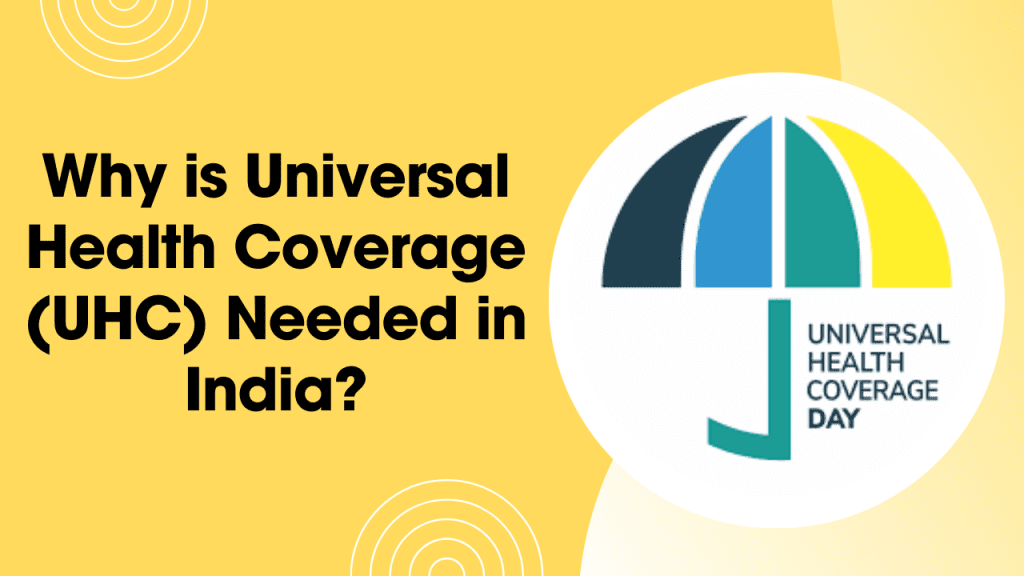In a country like India which is diverse and populous, the healthcare plan often faces challenges that often lead to inequalities in access to quality care. However the need to Bridge this gap is very essential to ensure that every individual lives a healthy and fulfilling life. We must work towards universal health coverage to address these disparities and create a more equitable healthcare system. Hence lets explore why is universal health coverage is needed in India.
Introduction to the concept of Universal Health Coverage (UHC)
Universal Health Coverage (UHC) provide healthcare services to all. It ensure that everyone has access to essential health services easily without any financial barriers. UHC is one of the main components for attaining bearable development.
The concept of UHC holds three major pillars:
- Equity,
- Quality
- Financial protection.
Equity ensure that all individuals must have equal access to quality healthcare services irrespective of their gender, race, and socail economic condition. Quality highlights the effective, safe healthcare services.
Financial protection ensures that every individuals must not face any health expenditures related to medical care.
In India, where healthcare are prevalent, the implementation of UHC can fill the gap between quality healthcare provider and needy ones. Currently, India’s healthcare system is and with rural areas insufficiently served. According to WHO reports, only 52% of Indians have access to quality health services.
How UHC can address these disparities and improve overall healthcare outcomes in India
In India, healthcare differences are very prevalent, However UHC is playing a crucial role in bridging this gap and enhancing overall healthcare.
Currently, there are major difference between healthcare facilities in urban and rural areas. UHC aims to provide equitable access to healthcare for all, regardless of their cast, sex financial condition etc. As a result now people living in remote areas will no longer have to travel long distances for medical care. Not only this but also UHC ensure that people receive timely treatment.
Secondly, UHC alsp tries to reduce the financial burden of healthcare. In India, most people find it difficult to pay for medical services whichbecomes a significant barrier for those living in poverty line or belonging to marginalized communities. However With UHC, individuals will no longer have to worry about paying for medical expenses as it has covered under the several health insurance scheme. In addition to improving their financial situation, it also encourages them to seek medical treatment whenever necessary.
Furthermore, UHC also contribute towards solving the inequality in providing the quality of healthcare services across the different groups in India. The current public health system is inadequate for providing quality healthcare in many parts of the country. However with implementation of UHC, resources are now allocated more efficiently in providing a quality healthcare services nationwide. Moreover, UHC schemes, emphasis on maintaining certain levels of quality healthcare across all part of the counrty.
Challenges and roadblocks to implementing UHC in India
Despite all the efforts towards achieving Universal Health Coverage (UHC), however there are many challenges that hinder the successful implementation of this challenging goal. These challenges includes poor funding, lack of resources, insufficient human resources, and socio-cultural barriers.
Moreover the government is also not able to provide sufficient funds fpr healthcare, leading to a burden on people seeking for healthcare services. This has also resulted in high pocket expenses, making healthcare inaccessible and unaffordable for many. Additionally, the budget allocated for health is often used in other sectors such as defense or infrastructure development.
Another major challenge is the lack of esources in the country’s healthcare system. Despite the largest networks in the world, still lacks in basic amenities such as electricity supply or clean water. This makes it very difficult in delivering quality care.
Potential solutions and strategies for achieving UHC in India
India made progress in achieving Universal Health Coverage (UHC) in recent years, but there are still challenges need to solved. Lets take a look at some potential solutions and strategies that can ridge the gap and achieve UHC.
- Strengthening Primary Healthcare: The key tactic for achieving UHC in India is empowering primary healthcare. This includes access to essential health servicesat health centers (PHCs) and sub-centers.
- Investing in Human Resources for Health: Healthcare system of India often faces a shortage of good healthcare workers, especially in rural areas. To solve this issue, it is important to invest in training doctors, nurses, and community health workers and health professionals.
- Expanding Health Insurance Coverage: Health insurance helps in achieving UHC. Currently, 30% of the Indian population has some form of health insurance coverage. The government can expand public insurance programs to cover more people from vulnerable groups.
- Improving Public Healthcare Infrastructure: Improper infrastructure of hospitals leads to barrier for accessing quality healthcare services in India. To overcome this challenge, the government must invest more funds in building hospitals and health care centers.
There are numerous benefits to both individuals and society as a whole from implementing Universal Health Coverage in India. As well as bridging existing gaps in healthcare, it would also promote equity and contribute to a healthier and more prosperous country.
Related Posts:
Old age home in Indore , A place for homeless people
Online Donation For Old Age Homes
Advantages & Disadvantages of Old Age Homes


I have a great command of sophisticated language and literature because I am an artist at heart as well as a writer by profession. I am able to constantly produce work of a high quality because of my knowledge. I’m well-known for my versatility and am an excellent writer of both creative and technical content. To write content that is both entertaining and customized, I take the approach of getting to know the interests and preferences of my targeted audience.

